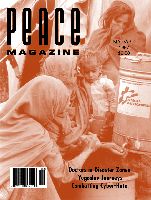
Peace Magazine Mar-Apr 1997, page 30. Some rights reserved.
Search for other articles by Shirley Farlinger here
Project Ploughshares, Institute of Peace and Conflict Studies, Conrad Grebel College, Waterloo, ON, N2L 3G6 (519-888-6541).
You regularly read Peace Magazine, scan the newspapers and attend to the television and radio hard news but you still feel you don't have the whole picture of wars around the world. You could subscribe to a dozen more magazines, read a dozen more books, key onto the "net" and compile the results or you could simply order a copy of Project Ploughshares' Armed Conflicts Report 1996. Bill Robinson, Brant Birks, Ernie Regehr and a team of researchers have done the work for you.
This large-format, 28-page report begins with a word from the ever-hopeful Archbishop Desmond Tutu. Imagine the suffering behind the statistics, he says, and be motivated to action on landmines, arms-spending and refugee crises. "We are made for togetherness, and responsibility for upholding the law rests with each one of us."
It's clear that in some countries the only togetherness going on is at the point of a gun. Half of today's 40 or so conflicts are internal wars born of social chaos. Unfortunately, the report does not ask how much of this chaos is due to world trade policies which continue to impoverish humanity.
Fourteen wars were fought in Africa, ten in Asia, six in Europe, three in Latin America and five in the Middle East. Each conflict is described in 200-300 words, more informative and unbiased than anything I have read elsewhere. Listed with each piece are the countries who supply the arms. "Don't cry for me," sings Canada's military export industry with a $500 million business, excluding dual use and America-bound military "goods". In 1995 Canada supplied arms to about one-third of the world's conflicts.
The map of the nuclear weapons-free zones (all in the south) and the nuclear nations (mainly in the north) shows a difference in thinking. The good part is that most of the world's population now lives in nuclear weapons-free areas. Disheartening is the news that all the efforts in Cambodia-a ceasefire, a constitution and an election-have not stopped the Khmer Rouge. And some news never gets attention. Do you know where the Republic of Abkhazia would be if it wins independence?
Is Canada part of the solution? We took part in 12 U.N. and five non-U.N. peacekeeping/observer/enforcement missions in 1995. They ranged from MINUGUA (Guatemala) to UNTSO (Egypt, Lebanon and Syria).
"We [the authors] hope the report will give Canadians a better understanding of current upheavals and ideas on how we could respond in ways that are not military. We send it to some key people in government. We are preparing a teaching package to go with the next report which will be out in the summer. It will be for students as well as the public."
More children (under 15) are enlisted in armies and more are maimed by landmines than ever before. Two million have been killed and 12 million left homeless in the last decade, according to the report. Why has the world remained silent in the face of such blatant evil?
Reviewed by Shirley Farlinger, a Toronto writer and activist.

Peace Magazine Mar-Apr 1997, page 30. Some rights reserved.
Search for other articles by Shirley Farlinger here